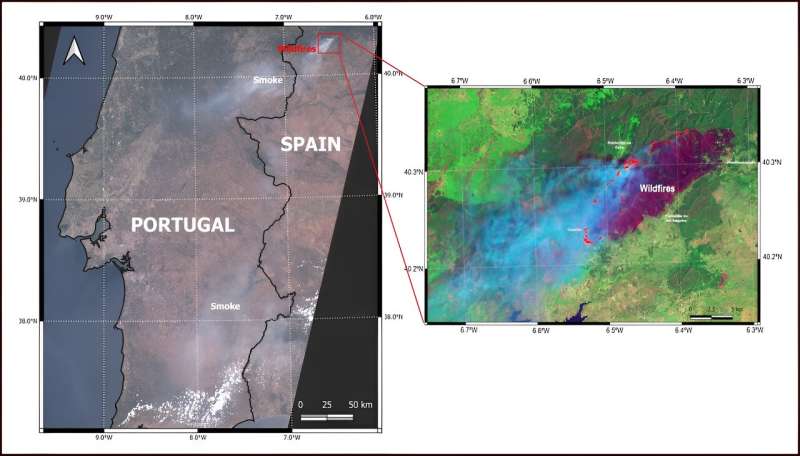This article has been reviewed according to Science X's editorial process and policies. Editors have highlighted the following attributes while ensuring the content's credibility:
fact-checked
trusted source
proofread
How wildfires and weather affect Portugal's public health

The past few decades have passed in a smoke-filled haze as severe wildfires have blazed across forests and tundras on multiple continents, frequently turning skies orange and triggering air quality alerts. These fires often occur in tandem with events such as heat waves, which have become more commonplace, and the resulting pollution can be carried with weather systems far from fire sites.
Wildfire smoke and particulates are harmful to human health, especially the cardiovascular and respiratory systems, and the elderly, pregnant, and socioeconomically disadvantaged populations are especially vulnerable to these health risks.
In new research, de Souza Fernandes Duarte and team studied health effects from wildfires, pollutants, and meteorological factors in Portugal. Portugal is located in the transition zone between subtropical and midlatitude climates, and the region frequently experiences intense droughts, heat waves, and wildfires. The research has been published in GeoHealth.
In particular, the researchers focused on correlations of mortality rates with temperature, relative humidity, wind speed, burned area, and aerosol optical depth, as well as concentrations of carbon monoxide, nitrogen dioxide, ozone, fine particles with diameters that are generally 10 micrometers or smaller (PM10), and PM2.5 particles from 2011 to 2020.
The team considered fires that burned more than 1,000 hectares during the fire season months of June–October, and they examined how these fire, pollution, and weather variables affected mortality related to circulatory or respiratory diseases.
They used principal component analysis to create two indices: pollutant-burning interactions (PBI), which correlated with burned area and pollutants, and atmospheric-pollutant interactions (API), which correlated with temperature, relative humidity, and ozone. The team found that cardiorespiratory deaths were highest during the hottest, driest, and most polluted months of the wildfire seasons. In addition, high temperatures, low relative humidity, and high near-surface ozone concentrations increased the overall burden of disease in exposed populations.
The researchers note that the development and improvement of environmental health indices, such as PBI and API, can help raise public awareness of health risks and inform public health decisions.
More information: Ediclê de Souza Fernandes Duarte et al, Fire‐Pollutant‐Atmosphere Components and Its Impact on Mortality in Portugal During Wildfire Seasons, GeoHealth (2023). DOI: 10.1029/2023GH000802
Provided by American Geophysical Union
This story is republished courtesy of Eos, hosted by the American Geophysical Union. Read the original story here.





















